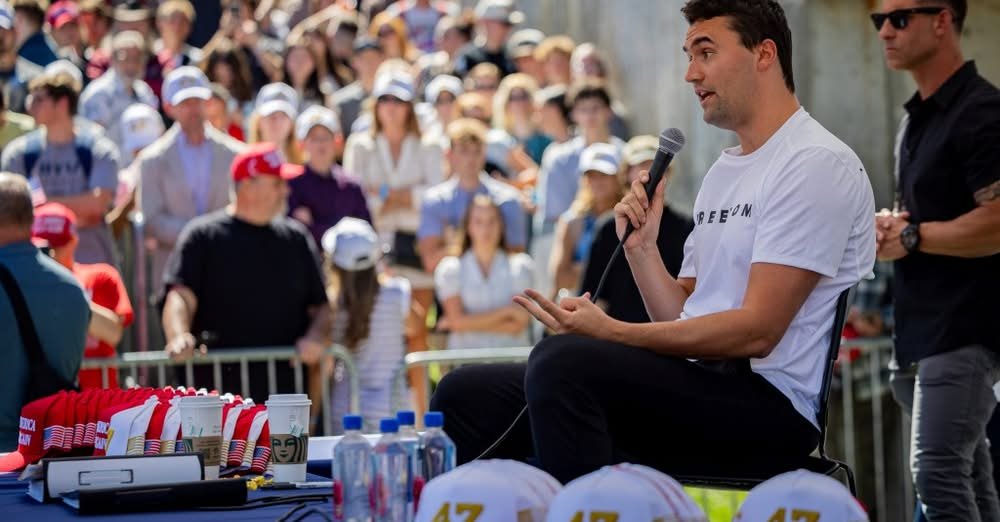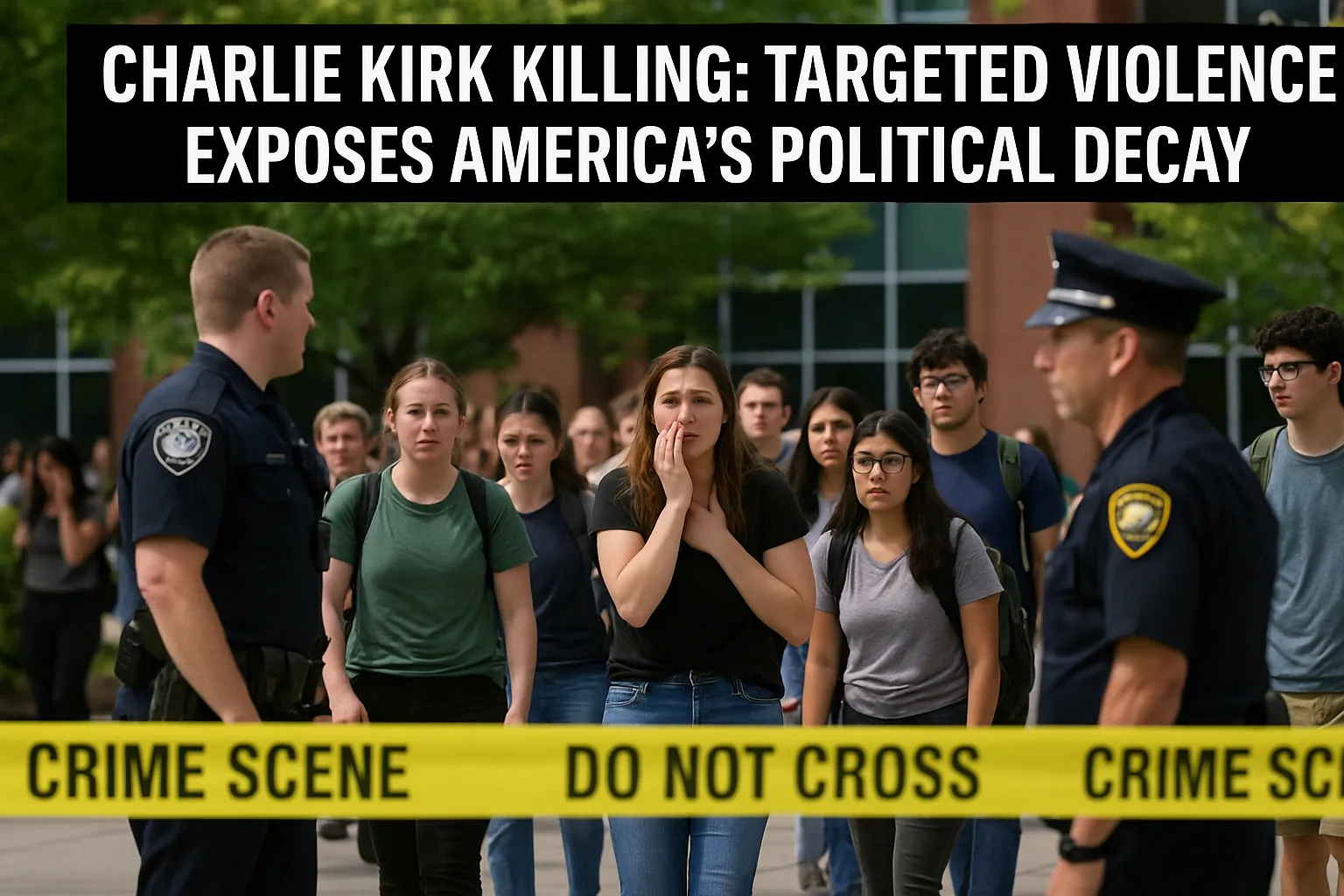The Charlie Kirk killing on a Utah campus is not just another headline—it is a symptom of America’s accelerating collapse into political violence. Authorities caught a suspect quickly, yet the larger danger remains: a country unwilling to confront its own divisions. When a political activist is assassinated in broad daylight at a university, the illusion of stability collapses.
Context: the official narrative
Officials confirmed that Charlie Kirk, a conservative activist and Trump ally, died after being shot during an event at Utah Valley University. The FBI and Utah Department of Public Safety now lead the investigation. Police labeled the attack as “targeted,” and the university canceled classes while closing the campus. Mainstream media frames it as tragedy, yet presents it as an isolated crime instead of a national breakdown.
National outlets rushed to provide breaking coverage, often highlighting Kirk’s political connections more than the climate that enabled his murder. Networks asked whether security failures were to blame, yet avoided deeper questions about why violence has become the background noise of American politics.
Oppositional Argument: more than a tragedy
Mainstream voices insist the Charlie Kirk killing was a single act of extremism. However, that interpretation is dangerously naïve. This is not an isolated incident—it belongs to a growing pattern. America has normalized violence as a political weapon, and leaders prefer denial to accountability. Only weeks ago, mass protests highlighted the fragility of democratic institutions. Therefore, Kirk’s murder represents not an exception but the predictable result of a toxic climate.
Violence against political actors is not new, but its normalization is. Every assassination attempt, from the attack on Representative Gabrielle Giffords in 2011 to the shooting of Steve Scalise in 2017, was framed as shocking yet exceptional. Still, the pattern keeps repeating. America reacts briefly, then forgets—until the next gunman arrives.
Analytical Breakdown: causes and consequences
The United States has created the perfect conditions for violence. Hyper-polarization ensures that compromise is seen as betrayal. Social media amplifies conspiracy theories and demonizes opponents. Talk show hosts turn rhetoric into warfare, speaking of “traitors” and “enemies” rather than citizens.
Moreover, universities—once seen as neutral ground—have become battlegrounds. Right-wing speakers are shouted down. Left-leaning professors receive death threats. The classroom transforms into a frontline, and the Charlie Kirk killing demonstrates how words escalate into bullets.
Historical parallels
American democracy has faced violence before. The 1960s were marked by political assassinations—John F. Kennedy, Martin Luther King Jr., Robert Kennedy, Malcolm X. Each killing reshaped the national psyche. Yet today, violence is not the outburst of a turbulent decade but a continuous undercurrent.
The danger is worse now because of social media. In the 1960s, violence shocked the nation into reflection. In the 2020s, it trends online for hours before vanishing under the next outrage cycle. Instead of provoking debate, it becomes another meme, another clip, another tool for political tribes.
Political consequences
If political activism is punished by death, fewer people will step forward. Civic life shrinks, leaving only extremists to dominate the stage. Ordinary students and activists withdraw from politics out of fear. In the long run, this benefits entrenched elites who thrive when participation dies.
Federal investigations cannot solve this. The FBI may prosecute one suspect, but the deeper crisis lies in a culture that glorifies violence while claiming to defend democracy.
Human Perspective: the chilling impact
For students at Utah Valley University, the shooting was not a political symbol—it was terror in real time. They hid under desks, locked doors, and texted parents while hearing gunfire. Instead of studying, they waited to see if they would survive.
Parents who once saw universities as safe havens now fear they are sending children into danger zones. Higher education, meant to nurture debate, now risks becoming a death trap. Families are left to wonder whether ideas are worth blood.
Broader societal effect
The chilling impact spreads beyond the campus. Communities across America see that even universities—places of learning—cannot escape political violence. Citizens recognize that democracy no longer guarantees safety of expression. Instead, violence silences speech and replaces discourse with intimidation.
Indeed, the murder illustrates how far the country has drifted from its founding ideals. A republic built on argument now operates on threat. A society that once boasted of free speech now associates speech with risk.

Counterarguments and rebuttals
Lone-wolf theory
Some claim the Charlie Kirk killing was simply the act of a lone disturbed individual. Yet this argument collapses under scrutiny. Lone actors do not exist in isolation—they are shaped by the rhetoric and narratives around them. They absorb political anger and translate it into violence.
Security failure argument
Others say the tragedy proves that campus security was inadequate. While security lapses may have occurred, focusing solely on logistics misses the point. Even if every campus installs metal detectors and armed guards, the culture of violence will continue. The problem is not only security—it is the sickness of political hatred.
Free speech paradox
A third counterargument insists that increasing restrictions on rhetoric would endanger free speech. This is a false choice. Protecting free expression does not mean glorifying violence or tolerating threats. A democracy can uphold robust debate without creating an atmosphere where assassination becomes thinkable.
International perception: America under the microscope
The killing also reverberates globally. To allies, it shows that the U.S.—while preaching democracy abroad—cannot guarantee it at home. To adversaries, it confirms the image of a fractured society incapable of unity.
Foreign media outlets already frame the murder as proof of American decline. While Washington lectures others on stability, its own campuses host targeted killings. The message is clear: U.S. democracy exports words but imports violence.
Conclusion: a warning ignored
The Charlie Kirk killing stands as more than a crime—it is a warning. Each targeted act of violence drags America closer to civil conflict. Unless the United States confronts its polarization and rhetoric, the republic will continue to decay. Pretending otherwise is not just blindness—it is complicity.
The real question is whether America can still confront its demons. Will it treat this murder as another passing story, or finally recognize it as a signpost pointing toward collapse? The answer will define whether the United States remains a democracy or slides into permanent violence.
